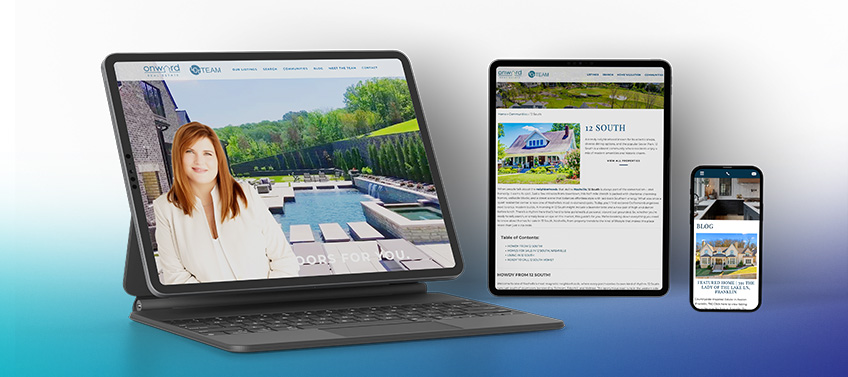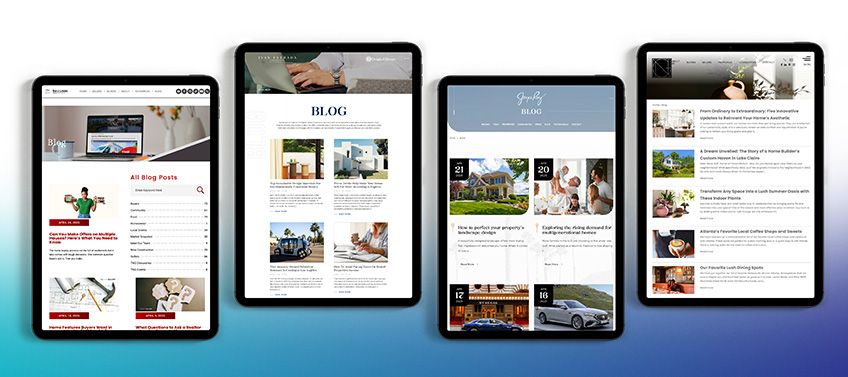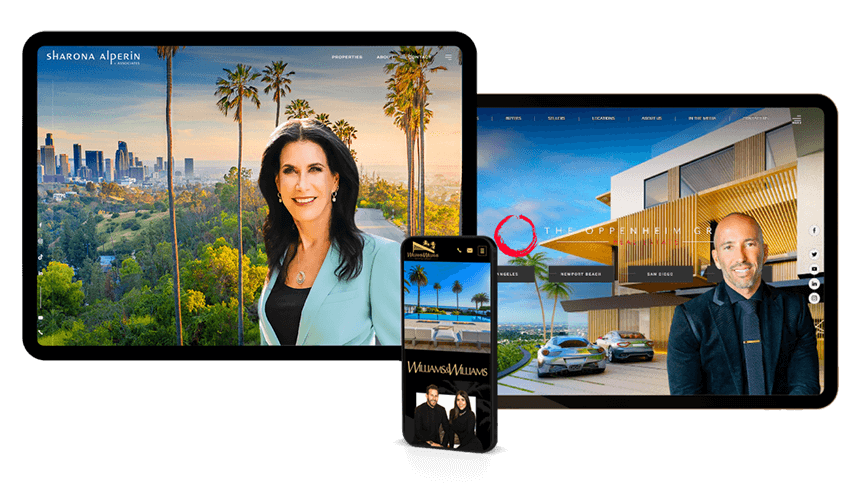How to Create and Optimize Real Estate Blog Posts Like a Pro
Even with social media and video content stealing the spotlight, blogging still pulls serious weight. Turns out, 80% of people actually enjoy learning about a business through custom content, and around 60% say they’ve been inspired to look into a product after reading about it. That’s a big deal when you're trying to build trust and stay top-of-mind with potential buyers and sellers.
Once you’ve gotten them to read your blog, though, getting them to convert can be a different story entirely. Fortunately, we’ve got some actionable tips to help you create real estate blog posts that not only inform, but also connect, persuade, and drive results. Let’s get into it.
Table of Contents
Before You Start
One of the biggest mistakes real estate agents make when starting a blog is going in without a plan. Your blog is a platform to share your expertise, answer real questions from buyers and sellers, and guide readers through the decisions they’re already trying to make. When done with intention, it becomes a powerful extension of your client experience. Here’s what to keep in mind:
-
Know your audience
Before putting pen to paper (or fingers to keyboard), think about your target audience. Are you trying to reach first-time buyers? Luxury investors? Sellers looking to downsize? Knowing who you’re speaking to helps narrow your focus and ensures that your real estate blog post ideas are tailored to the right audience. -
Set content goals
Whether it’s to educate, generate leads, or support SEO, every blog post should have a clear purpose. Focusing on one primary goal helps shape your message, tone, and call to action. -
Use a content calendar
Consistency builds trust and visibility. A content calendar helps you plan ahead, stay relevant, and deliver timely insights that align with your audience’s needs. -
Consistency, consistency, consistency
One-off posts won’t do much for visibility. But steady, thoughtful content published weekly or biweekly shows both search engines and clients that you’re active, reliable, and tuned in to the market. Over time, that consistency adds up to greater reach and more trust.
Why SEO Still Matters
A good blog post doesn’t exist in a vacuum—it needs to be discoverable. That’s where SEO comes in. Google now puts serious weight on something called E-E-A-T: Experience, Expertise, Authoritativeness, and Trustworthiness. These are the signals that tell both readers and search engines that your content is credible and worth paying attention to.
So what does that actually mean in practice?
-
Experience
Share firsthand insight. Talk about real transactions, local knowledge, or what you’ve learned on the job. -
Expertise
Make sure your content reflects what you truly know—your niche, your market, your role. -
Authoritativeness
Link to reliable sources. Reference industry reports, certifications, or even feature quotes from trusted professionals. -
Trustworthiness
Be clear, transparent, and accurate. Keep your information current.
Case in point: one of our clients in L.A., James Respondek, focused on hyper-local blog and neighborhood content for Pacific Palisades, Malibu, and Bel Air. Within months, his Malibu guide saw a 1,000% spike in views, and his site hit top rankings for high-intent searches like “Pacific Palisades luxury real estate agent.” Writing for real people works, and Google notices.

Your real estate blog posts should not only offer valuable information, but also be optimized for today’s search engines.
SEO Checklist
Even small details can help your blog meet today’s higher content standards. Here’s a simple checklist to keep in mind when optimizing your blog:
-
Search-driven keywords
Think like your reader—what would you Google? (e.g. “best neighbourhoods in Halifax for families” instead of “real estate tips”) -
Clear, keyword-rich titles
Make it obvious what the post is about and sneak in that keyword naturally. -
Digestible formatting
Like we said above, short paragraphs, subheadings, and bullet points are your best friends. -
Meta information
Craft a clickable meta title and description that includes your keyword and gives a reason to click. -
Internal links
Guide readers through your site by linking to related posts or resources. -
Alt text for images
It helps with accessibility and tells Google what your visuals are showing. -
A clear call-to-action
Every post should guide the reader toward something useful—whether that’s exploring listings, getting in touch, or learning more. Add your contact details or link to relevant pages like your property search, a downloadable guide, or your consultation form.
Bonus Tip: Use Google Keyword Planner. It’s a free tool that gives you insight into search volume, competition, and trending topics. You’ll need a Google Ads account to access it, but you don’t need to run any ads.
Once inside, plug in a broad phrase like “buying a house” or “homes in Scottsdale.” Google will suggest related keywords—some with high volume, others with lower competition. This is where blog ideas begin. You might start with “first-time homebuyer tips” and end up with “down payment assistance programs in Arizona” or “what to expect during a home appraisal.”
What Should I Write About?
So you’ve got the strategy, the formatting, and the SEO. But what do you actually write about? The good news is that real estate offers an endless supply of content inspiration. Just remember: if a client has asked it, chances are someone’s Googling it. Here are some real estate blog post topics that you can personalize to your niche:
Buyer-Focused Topics
-
A First-Time Homebuyer's Guide to Buying a Home in [Your Area]
-
Homes for Sale in [Your Area]
-
How to Choose the Right Real Estate Agent in [Your Area]
Seller-Focused Topics
-
What You Need to Know Before Selling a Home in [Your Market]
-
Staging Tips to Help Sellers Prepare Their Home
-
The Best Time of Year to Sell a Home in [Your Market]
Local & Neighborhood Content
-
A Guide to Popular Neighborhoods in [Your Area]
-
Celebrity Homes in [Your Area]
-
What to Know About Living in Historic or Coastal Areas
Seasonal Tips & Trends
-
Seasonal Home Maintenance Checklists for Homeowners
-
Design and Renovation Trends Buyers Are Looking For
Financing Tips
-
Understanding Mortgage Options for First-Time Buyers
-
How Interest Rates Impact Your Buying Power

Not sure what to write about for your blog? Our team of expert writers can help you come up with a content strategy.
Lean into what performs
Not sure which types of content actually get results? Here’s what recent research shows:
-
51% of blog-producing businesses say how-to guides perform best
-
45% report success with industry news
-
42% find case studies effective
-
34% see strong results from encyclopedic articles
-
23% use product listicles with good engagement
As for content cadence, 40% of companies aim for a 50/50 mix of evergreen and timely articles. The split doesn’t have to be exact, but the balance matters. If you’re still not sure where to begin, try rotating through categories.
Say goodbye to staring at a blank page.
You’ve got the ideas. Now let our digital marketing experts turn them into traffic and long-term growth.
Tracking Your Blog’s Success
Congratulations, you’ve published your first blog! Or maybe you’ve been posting for a while, but aren’t quite sure what to do next. This is where tracking data helps immensely. Monitoring your blog’s performance helps you understand what’s working, what’s not, and where to focus your energy moving forward.
Here’s what to monitor:
-
Page views – How many times your post has been loaded
-
Unique visitors – The actual number of individual readers
-
Bounce rate – Are they sticking around or exiting immediately?
-
Average time on page – Are people skimming or genuinely engaged?
Use tools like Google Analytics or your website’s dashboard to track trends over time. Your best-performing posts will reveal what topics, tone, or format your audience connects with most.
Finally, keep your goals simple and focused. Maybe you want to bring more attention to a single neighborhood, spark interest in an upcoming development, or start building an audience around a niche you know well. Setting realistic, achievable goals helps you stay consistent and makes it easier to measure what's actually working.
Ways to Promote Your Blog
Much like how listings need visibility to attract buyers, your content needs exposure to reach the right audience. There are several ways to do just that, and they work even better when used together:
-
Social media sharing
Social platforms like Facebook, Instagram, and LinkedIn are natural places to share your blog. After all, you’ve got a built-in audience ready to engage with your content. Make sure to share each post with a caption that highlights the blog’s core message, and consider using an eye-catching graphic or image to go with it (this works especially well with visual platforms like Instagram). Don’t forget to link to the blog. -
Collaborations
Consider teaming up with other industry connections to cross-promote each other’s content. You can also co-author posts, feature expert quotes, or trade guest blogs to strengthen your credibility and build mutually beneficial relationships. -
Getting feedback
If a client mentions they read your blog, don't be afraid to ask what they found helpful or what they still want to know. There's no better feedback than one that comes from your target audience.
Frequently Asked Questions
Aim for at least one post a week, or every other week if that’s more manageable. Consistency and quality is more important than volume.
Yes, especially when they’re written with your audience (and keywords) in mind. Blog posts give search engines more pages to index and help drive organic traffic to your site.
Plenty! Market shifts are a great time to write educational content. Think financing tips, home improvement ideas, or how buyers can find value in a changing market.
It depends on the type of post, but here’s a good rule of thumb: go for 1,000 to 1,500 words for informational or SEO-focused blogs, 1,500 to 2,500 if you’re writing a detailed how-to or guide, and around 600 to 1,000 for quick news updates. Just make sure it’s helpful and worth the read.
Yes. Break longer posts into bite-sized tips, infographics, or reels. A single blog can fuel multiple content pieces across your platforms.
While it's not necessary, hiring a professional writer can help ensure high-quality content that is engaging and optimized for SEO, freeing you to focus on other aspects of your real estate business. However, if you have strong writing skills, you can certainly create impactful posts yourself.
Ready to see real results from your blog content?
Writing great content takes time, and for most busy agents, it quickly becomes one more thing on an already packed to-do list. But you don’t have to do it by yourself. Agent Image has a team of experienced, human content writers with decades of combined real estate and digital marketing expertise.
Contact us at 1.800.979.5799 or click here to schedule a free consultation!





